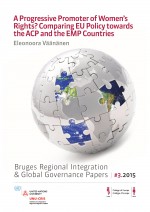The EU Common Foreign and Security Policy in the UN Security Council: Between Representation and Coordination
The purpose of this paper is to explore the link between the reform of the United Nations Security Council (UNSC) and the development of the Common Foreign and Security Policy (CFSP) of the European Union (EU). More precisely, it addresses the question to what extent and how the UN institutional structure has an impact on European integration in the field of foreign and security policy. To answer this question, the paper analyses, on the one hand, the debate on the European presence and representation within the Security Council, and on the other hand, the EU’s increasing coordination on the issues discussed in this body. Finally, it looks at how future reforms of the UNSC would affect the CFSP. The growing role of regional organisations in the United Nations is increasing the pressure to reform the UN. In Europe, the discussion on the reform of the UN has run parallel to the institutionalisation of the CFSP. Since the Maastricht Treaty on Euro- pean Union (TEU), the CFSP began raising expectations about the possible role of the EU in the UN, ranging from a common representation to a more effective coordination of the EU member states in the Security Council. I argue that the reforms of the United Nations and of the EU are mutually reinforcing. On the one hand, further European integration pressures the UN to reform. On the other hand, the UN reform (or the prospect of reform) has an impact on the CFSP. First, it frames the discourse and national preferences of the member states and, secondly, it opens new institutional opportunities and paths for European integration in foreign policy. In this sense, the structure of the new UNSC could have an effect on the future development of the CFSP, either strengthening the current trend towards flexible forms of cooperation or encouraging new patterns of integration, coordination and representation.



